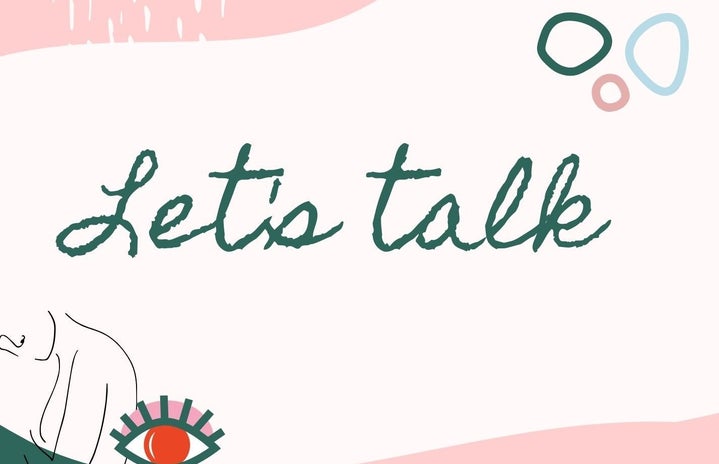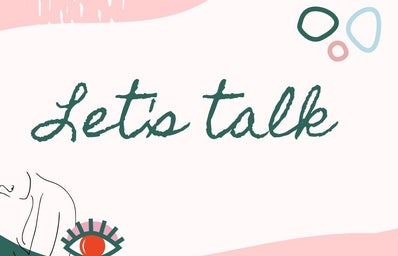Self-confidence seems to be a weapon that separates those who are in charge and those who follow. While it’s all something we strive for, it is not always as easily attainable as we may think. I believe it is notable to say, at least in my case, self-confidence comes in waves and although we may feel great one day, the next day might present new challenges. Through these four TedTalks, I have gained more tools to not only exude confidence externally but to also feel it innately.
- How to Build Your Confidence – and spark it in others | Brittany Packnett | 13:31
-
In educator and activist Brittany Packnett’s TedTalk on confidence, she gives advice to her listeners as not only how to gain confidence internally, but how to cast that confidence onto others. In the opening statements of her talk, Packett describes the underestimation we place on having confidence. Oftentimes we refer to confidence as a ‘soft skill’ rather than a dominant one, such as holding knowledge and having access to premium resources. She refutes such belief by advocating that confidence is the difference between being inspired and actually ‘doing’. Essentially, when we get stuck on our insecurities, we cannot get started with our future. Permission, community and curiosity: these three words are what, in Packnett’s mind, allow for self-confidence to arise. Permission births confidence, community nurtures it and curiosity affirms it. In more simple words, you must allow yourself to see the potential you have, surround yourself with those who embody confidence themselves and exert that power onto you, and finally, you must be curious about your failures and setbacks rather than aggressive and damaging. She concludes her TedTalk with the lasting impression that you cannot be what you can’t see. You cannot become what you want without holding the confidence to envision yourself in that position.
As someone who would label themselves as an extreme overthinker, this TedTalk had an incredibly lasting impact on me. I am often someone who doesn’t try new things, or won’t go out of her way to do something if I don’t believe that my execution of it will be flawless. My generation has grown up on the notion that what we present must be flawless, or at least pretty dang close to it. We are indulged in academics, extracurriculars and all sorts of knowledge from the very moment we enter this world. We are taught that the more knowledge we gain, the more powerful we remain. However, what we have failed to be taught is that our intelligence, our athleticism, our beauty cannot reach its full potential without the confidence to go out in the world and show it. I could provide endless examples of moments and opportunities I passed up through my high school years for the simple reason that I was not confident enough. Packnett’s TedTalk has helped me come to the realization that confidence is the barrier that is between doing and dreaming. After watching this speech, I now give myself permission to defy any expectations on myself and start acknowledging my beauty, my strength and my intelligence as it is.
- The Secret of Becoming Mentally Strong | Amy Morin | 15:02
-
Amy Moring opens her TedTalk about mental strength with a quick anecdote about her Facebook friend’s feed that seems so perfect. She talks about how jealous she, as many others can probably relate, can sometimes feel when she scrolls through the feeds of her friend and others on social media. “Why don’t I have what they have?”, “What did they do to deserve that life?” and other questions along similar lines tend to pop up in our heads. Moring tells us this simple bad habit that we all seem to do from time to time can be detrimental to our mental strength. She explains the three kinds of destructive beliefs and how they rob us of our mental strength. The first: unhealthy beliefs about ourselves. We tend to feel sorry for ourselves and when any sort of mishap occurs in our lives, big or little, we tend to magnify our misfortune causing our self-pity to intensify. As Morin explains, this creates damage to our mental strength because it keeps us stuck. It keeps us in the same self-pity party for an unnecessary amount of time that closes the gap between us and a happy life. While we must allow ourselves to feel the emotions of being sad, pitying ourselves is where the destruction begins. The second form of destructive beliefs is the unhealthy beliefs about others. This form of belief allows others to control us. While we place the blame or feel ill towards others who may be butting heads with us or have something we don’t, we lose our power of choice and response. Finally, unhealthy beliefs about the world can cause great damage to our mental strength. We tend to believe the world owes us something, but while we expect perfection of and from the world, disappointment is the only thing to show. Once we realize that the world is not fair and that in order to make it fair or at least appear so, we must take matters into our own hands and focus on being the driving forces behind our lives. Morin exclaims that the secret to being mentally strong is ridding yourself of all bad habits, no matter how big or small they may seem. Although rolling your eyes at an Instagram post by your friend who seems to ‘have it all’ may not impact you or that person negatively at that moment, there will be a lasting impact that will hold on your confidence forever (unless worked to get rid of). Finally, Morin concludes that in order to get rid of our bad habits, we must acknowledge them first and then counter them. We often allude to the destructive set of beliefs above because we are trying to escape uncomfortable emotions. Once we realize that the only way to get past uncomfortable feelings is to go through them. We should allow ourselves to feel raw emotion without coming up with an excuse, or pity party, that deemphasizes the feelings born innately in us.
This TedTalk was, in plain terms, a wake-up call. I will be the first person to admit that I find myself in pity-parties more often than I would care to admit. Moring’s talk allowed me to open my eyes in the sense that I must understand that the little things add up. While I consider myself to be self-loving, most of the time, and non judgemental, the small micro-actions I take in my daily life do build up. Whether it’s me stalking an influencer who is living my ‘dream life’ or feeling slightly jealous when my friend gets something I secretly was hoping for too, I find myself contributing to the decline of mental strength. I admired the way Moring not only was able to present me with these underlying bad habits I have but also how to combat them in everyday life. After watching this video, I can move forward with my day to day life not doing anything overwhelming life-changing but can start making myself mentally stronger through small good habits. Showing gratitude, support and allowing myself to feel emotions in real-time are all things I am going to emphasize in my day to day life moving forward.
- Stop Sabotaging Yourself | Debi Silber | 8:57
-
Short but sweet, Debi Silber’s TedTalk on self-sabotage hit a homerun in exactly how I, and I’m sure many of us, have been feeling lately. Opening her discussion, she speaks of three clients of her past and gives us specific examples where self-sabotage took over a person’s life. First, we have the top executive who starts going to the gym to clear her mind only to come to the realization that she has been working her butt off on climbing the corporate ladder in a field she is only in because of her parents. Then, Silber sheds light on the multi-faceted woman who juggles being a mother, a wife, an employee all in a day’s worth. The overworked woman takes up some new healthy eating habits that lead to the realization she is not only unhappy in her line of work, but also in her marriage. Finally, there is the average worker who meets with his buddies monthly to complain about their professional and personal lives. This man begins to work on self-fulfillment and starts watching TedTalks amongst other motivational content and realizes he has outgrown his friends. While all three stories present different realizations, they all conclude in the same way. They all ended up quitting their new habits of going to the gym, eating healthy and watching self-fulfillment videos because they did not want to challenge the structure of their lives. Silber calls this self-sabotage. Why do we sabotage ourselves? Well, Silber puts in fairly simple terms: we’re scared of change. Not only are we scared to venture into the unknown, but we also realize that the path to new habits and a new life require much more effort and work than do old habits. Just like they say, old habits die hard. We look at the gains versus the losses we might obtain/lose if we jump towards a new future because we know what we are losing, but what we are gaining is not concrete. Silber also talks about the fear of external judgment and disapproval while simultaneously having an internal conflict can feel overwhelming. However, what Silber argues is the fact that these uncomfortable feelings are temporary, and often are short-lasting. Once a breakthrough occurs, we become inspired, energized and fueled by our own potential.
As a sophomore who has already attended two separate colleges, I can attest to the ‘change is scary’ theory. All those self-sabotaging strategies mentioned above were something I battled with as a freshman deciding if I should transfer or not. Ultimately, I broke the barrier and had a major breakthrough and although this semester is unlike any other, I am happier than ever with my decision to move schools. Self-sabotage is something I think we all fall victim to time and time again. This talk placed a great emphasis on the breakthrough of change and how if we break beyond the barriers of self-sabotage, we can find a sense of simultaneous peace and excitement all at once. So hopefully, next time I have a great epiphany or am presented with a life-changing decision, I take full advantage of all the things that could be.
- How To Love Your Body | Sarah Doyle | 11:31
-
The final TedTalk I have chosen to highlight is one that virtually every girl can relate to: body image. Sarah Doyle does an excellent job on empowering young women to rebel against the unfair presumption that those who have the audacity to love themselves for all they come with are selfish, snotty and arrogant. She begins her speech with a brief history of her own battles with eating disorders and body dysmorphia. She talked about how she would go day by day staring at herself in the mirror hating what she said. I can relate. Growing up with little to no curves, and as a poc in a predominantly white town, I never quite fit the bill of what my hometown, and society for that matter, ruled as ‘beautiful’. However what I failed to realize, and Doyle’s talk helped me realize, was that there is no right way to be beautiful. There is no wrong way to have a body. Our bodies are not objects, they do not need to be fixed, and there most certainly isn’t a superior option. The problem isn’t our bodies, it’s our logic. While the standard of beauty is constantly changing, we are only falling further and further into a deep hole of a self-loathing society as we try to emulate in real-time whatever beauty standards are trending at the moment.
Self-loathing is a full time job and a tiring one at that. Doyle shares that on average, young women spend 1-3 hours a day contemplating their self-image, oftentimes in a negative light. What she presents next is a solution. While the normal self-love advocates tell us to love all our flaws, Doyle presents a different perspective. She argues that we do not need to love every detail on our body, and that very notion is unrealistic, but we should love the good with the bad. While instead of hating my short legs that I always compared to my tall friends, or the models on the cover of magazines, I can instead emphasize what I can do with my legs. I can run, walk, jump and so much more. While I don’t have to love the look of my legs, I do remain thankful that I have them and that they give me capabilities that I often take for granted. Even further, Doyle discusses the importance of placing your energy on what you do love about yourself. Take your biggest asset, your greatest feature and highlight that without the worry of looking arrogant or self-absorbed. We are all unique in our own ways, and as Doyle exclaims, there is endless amount of beauty in this world.
Self-confidence is a never ending process and while you may never fully master the concept, this is a great place to start. These four videos not only spot the hindrances we place on our lives that deteriorate our confidence, but they also share great strategies that allow us to move beyond the barriers of our insecurities.



